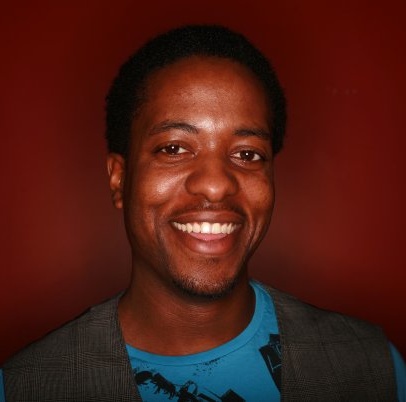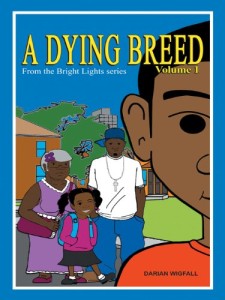Interview – Darian Wigfall, author of A Dying Breed
Self-Publisher’s Showcase: Today we are joined by Darian Wigfall, author of A Dying Breed: Vol. 1 in the Bright Lights series. Welcome to the Showcase Lounge, Darian.
Darian Wigfall: Thanks. It‘s good to be here.
SPS: For any of our readers that haven’t come across your work previously, can you take a moment to tell us all a little about yourself?
DW: I’m from St. Louis Missouri. I was born and raised here and it’s where I do most of my volunteer work. I’m 34 years old. I do a lot of creative things in pursuit of my dreams, like running a music collective and a clothing line. I also help run a tutoring program called Artists as Tutors where we work with kids from Ferguson, helping them with their homework, mentoring them and exposing them to a wide range of artists and artistic skills.
SPS: What are your perfect writing conditions, and how often do you write?
DW: My perfect writing conditions are a cool room, a comfy bed and some snacks and water to tide me over. I write probably 2 to 3 times a week.
SPS: Can you put your finger on the moment where you decided that you wanted to publish your work?
DW: I think the moment I decided to actually publish was when I got the second illustration from my brother Lee. At that point, I knew it was really going to happen and that we had to see this through to the end.
SPS: Why do you think it is that you have found yourself writing in the style that you do?
DW: In some ways I think I’m still finding my writing voice. This is my first book, and my first time writing for young people, so I guess I’m really drawing on my years working with young people, while trying to write in a way that I could have related to as a kid.
SPS: What would you say if anything best differentiates you from other authors?
DW: One of the things I imagine differentiates me from other young adult authors is that I’m not a teacher or child development professional and I don’t have any children myself. I never really saw this as a barrier to writing the book, and the series is just one thread of a broader vision of mine to create a platform for myself and others that I serve to speak on social justice and other issues that face us as humans.
Having been involved with the movement that has coalesced here in St Louis since the killing of Michael Brown in August last year, and having seen first hand the profound impact on young people in the community, I feel an even stronger urge to continue with the other books.
SPS: Can you take a moment to tell us all about your debut release A Dying Breed?
DW: A Dying Breed is a story as closely rooted in reality as I could make it – in fact, it’s based on a young friend of mine, whose story really struck me as both personal and universal. It’s about a boy named DeShaun Henry, who is a talented artist. A lot of his friends – and his adored big brother – are increasingly involved in gangs and drug dealng and try to convince him to make those same decisions..
Though he is tempted, he pours his energy into his passion for art, doing chores for his grandmother to raise the entry fee for an art contest. Like in real life, these choices are not simple – in fact, the reason DeShaun has been able to develop his talent is that his older brother Michael pays for his art supplies with money he earns selling drugs in the hope that art will provide his younger brother a path away from the streets
It deals with issues around a lost generation of parents, of poverty and inequality and the blurred edges between right and wrong when your very survival is a day to day gamble.
SPS: From the first word on paper to the complete work, how long did you spend on A Dying Breed?
DW: The process took me nearly a year and a half from the first word to a full manuscript, though I wrote it in spurts over that time while working full time as a cell biologist.
SPS: Where did you inspiration come from in creating your protagonist DeShaun?
DW: The inspiration for creating DeShaun came from a young man I mentored named Earl Willis, but it’s also informed by my own life and adolescence, including my experiences dealing with family members that sold drugs and got caught up in that world.
SPS: Have you included any of your personal experiences in creating your work ?
DW: Yes, definitely. I have family that has been involved in the street life and friends that were much like James in the book, a character who ends up joining the gang and selling drugs.
SPS: What feelings would you like to invoke in your readers?
DW: I would like to invoke empathy, joy and sorrow in my readers. I want them to experience the wins as if they were DeShaun when he wins and feel his pain when life kicks him in the behind. I want those kids that can relate it to their own lives and struggles to see themselves in the characters, and those that find it unfamiliar to try and put themselves in DeShaun’s shoes – to use the story as a way of understanding more about the lives of other people.
SPS: Have you received feedback from anyone that has been positively affected by your book?
DW: Yes! A young man I have been mentoring who is 15 years old told me a powerful story. He said that after he finished the book, he gave it to his mom to read, and that after reading it, she eased up on him a little in terms of the way she related to him. I think the parallels to DeShaun made her consider just how tough it can be to stay on the right path. This young man tries hard, works towards his goals and – for the most part – stays out of trouble. Given the potentially lethal impact that systemic racism can have on black people – especially young black men – and the stark choices that these kids often face in their own communities, that should be held up as a feat.
SPS: Do you have a favorite review of the book?
DW: The best reviews I’ve had are from young readers – the young man I mentioned who shared the book with his mom, for example. I was also struck by a very perceptive comment from the nine-year-old son of a friend of mine who told me he enjoyed the book, but knew the teachers at his predominantly white school would find it diificult to relate to, to even comprehend the stakes kids like DeShaun deal with every day
SPS: What’s next on the self-publishing horizon for yourself?
DW: I’m nearing the completion of my second book, the first in the companion series to A Dying Breed. Its called ‘Not-So-Princess Jasmine’, and picks up on the story of Deshaun’s friend Jasmine.
SPS: Was the Self-Published/Indie-Published route always your preferred route for your work?
DW: Self-publsihing was really the only route for a relatively inexperienced and unpublished budding writer like myself. As someone who works with all sorts of artists in a variety of different mediums, I find the rise of DIY publishing, music and multimedia art production and distribution that’s been facilitated by the digital era to be fascinating and empowering, so I’m pleased to have been able to experience it first hand.
SPS: Has the experience so far been all that you thought it would be?
DW: I can’t say I totally knew what to expect – I have been pleased with the print to order system that my publisher uses, and I haven’t had an issue with myself or anyone getting a damaged or distressed book. The quality has been relatively uniform in regard to ink saturation and illustration picture clarity.
Overall, the experience of writing my first book has made me hungry for more!
SPS: If you could give one piece of advice for someone looking to get into writing, what would it be?
DW: Get started today. Don’t wait until it’s the right time. Just get started and see where it goes. Also, make regular time to write if it seems like its something that makes you happy.
SPS: Before we bring this interview to a close, it’s your chance to name-drop. Anyone who you feel is deserving of more recognition at present or someone whose writing you have recently enjoyed? Now is your chance to spread the word…
DW: Cheeraz Gormon has a book of poetry called In the Midst of Loving that is phenomenal! I am also looking forward to reading ‘Ferguson is Everywhere: Roots of Rebellion’ by veteran St Louis activist and organizer Jamala Rogers.
SPS: Thank you for joining us today, Darian, and all the best for the future.
DW: A pleasure – I really appreciate the opportunity to spread the word about the book.
SPS: For more information on Darian Wigfall and his work, please do visit his Showcase Author page here.















Leave a Reply